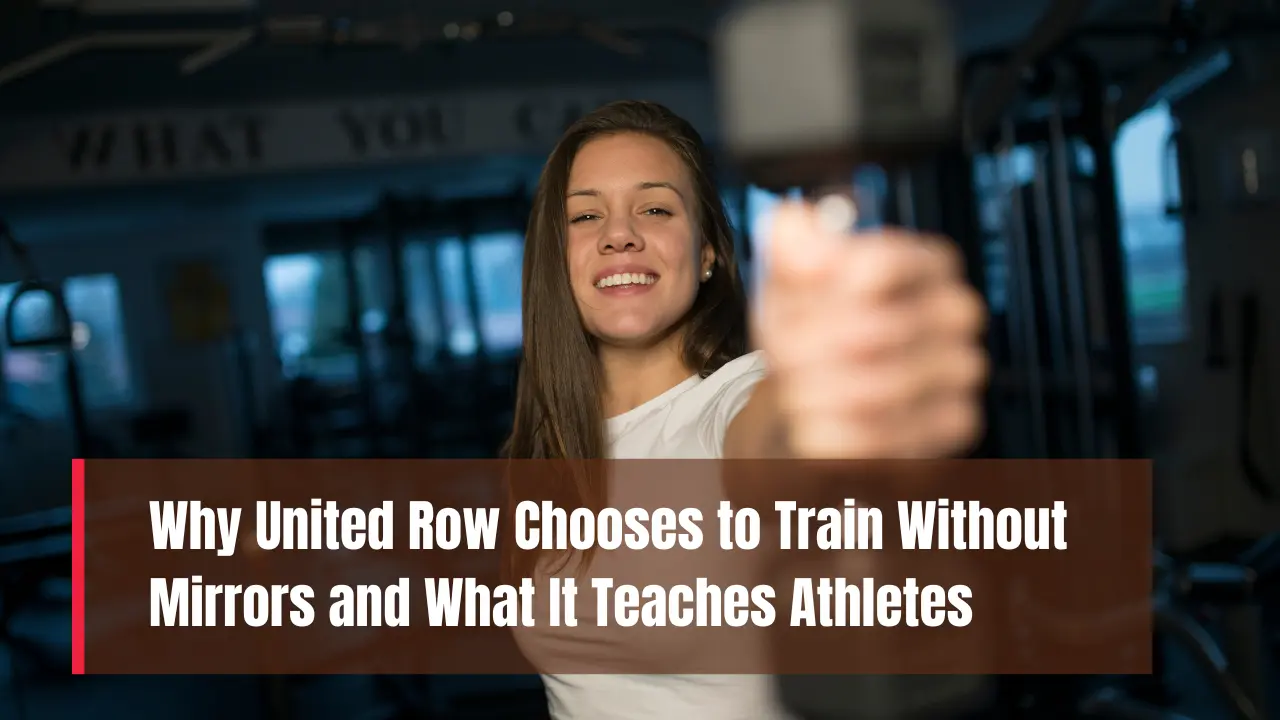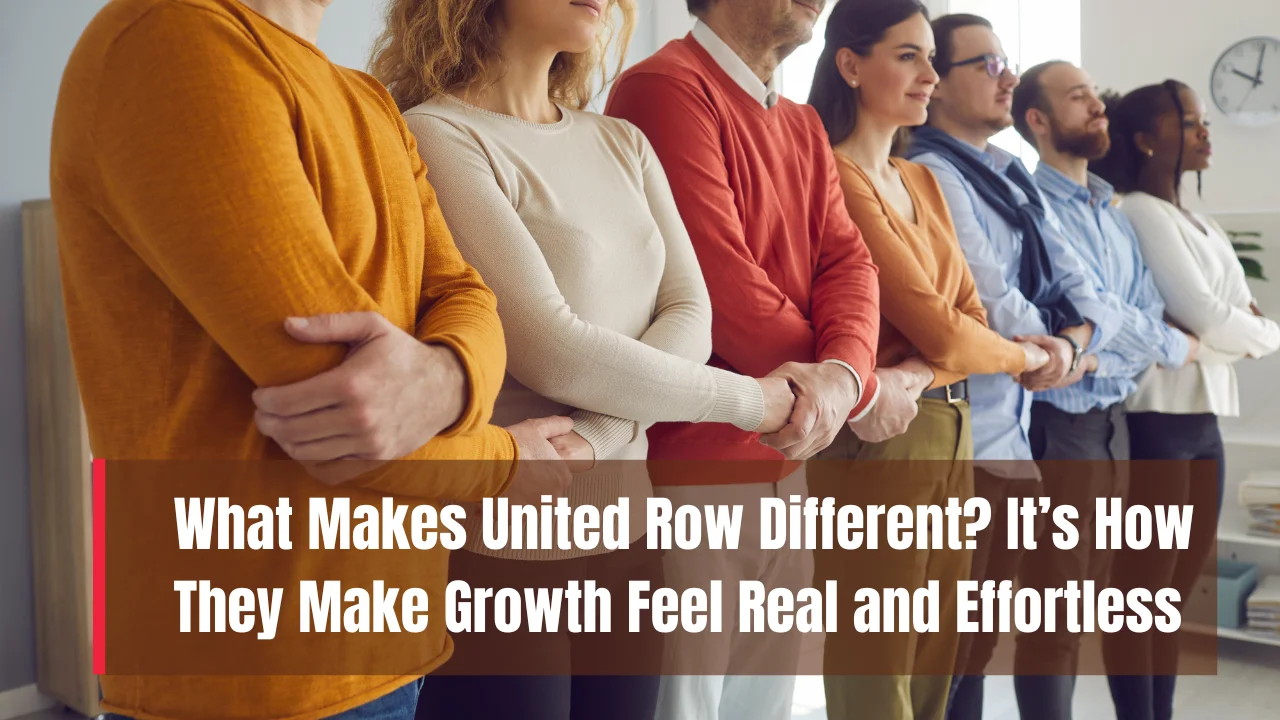United Row: United Row has taken a path few training programs dare to follow—eliminating mirrors entirely from their workout spaces. In a world where athletes often depend on visual feedback to correct and perfect their form, this bold move stands out. Most training environments are lined with reflective surfaces to allow instant self-correction, yet United Row’s approach challenges the norm, opting for something deeper and more meaningful.
In this article, we’ll explore why United Row made the deliberate choice to train without mirrors, and what powerful lessons this approach teaches athletes at all levels. From improving team rhythm to building stronger mental resilience, we uncover how this technique redefines performance and growth. Whether you’re a coach, athlete, or fitness enthusiast, this method offers valuable insight into the role of perception, self-awareness, and connection in sports.
How United Row’s Mirrorless Philosophy Transforms Training
United Row has adopted a mirrorless training model not just for novelty, but for purpose. This method encourages athletes to tune into their inner cues rather than rely on external reflection. Without mirrors, rowers are guided by feel, sound, and coaching rather than what they see in the glass. This builds a stronger mind-body connection, enhances team synchronization, and ultimately creates more instinctive and adaptable athletes. It’s a quiet rebellion against visual perfectionism, allowing rowers to grow through awareness and discipline, rather than image and correction.
Overview of United Row’s Mirror-Free Training Approach
| Key Focus | Brief Description |
| Internal Body Awareness | Enhances the feel of motion and posture without visual feedback |
| Team Synchronization | Promotes better group timing through auditory and kinetic cues |
| Mental Focus | Reduces distractions, improving attention and resilience |
| Athletic Discipline | Encourages consistency and personal accountability |
| Coach-Athlete Communication | Strengthens verbal feedback and understanding |
| Real-World Performance Preparation | Mirrors aren’t used in competition, mimicking race conditions |
| Confidence Building | Reduces overthinking and self-consciousness |
| Long-Term Performance Improvement | Focuses on sustainable growth rather than short-term visual fixes |
The Philosophy Behind United Row’s Mirror-Free Training
Unlike most programs focused on perfecting outward form, United Row prioritizes inward connection. Removing mirrors takes away the athlete’s ability to self-correct visually, forcing a shift to internal feedback. This shift doesn’t limit the rower’s development; instead, it strengthens it.
By using verbal cues, sensory awareness, and real-time corrections from coaches, athletes start to understand how their bodies move. Over time, this deepens their proprioception—the sense of position and movement—something that mirrors often override. The result is a rowing team that responds to instinct, rhythm, and feel, instead of visual confirmation.
Building Internal Body Awareness
One of the most profound advantages of mirrorless training is the development of body awareness. In traditional rowing training, athletes tend to fixate on their reflection, which can create a dependence that hampers performance in real scenarios. United Row aims to reverse this by teaching athletes to trust what they feel instead of what they see.
Athletes are encouraged to notice subtle shifts in their muscle engagement, stroke patterns, and breathing. They learn to associate certain physical sensations with effective form. This internalization makes their skills more transferable to competition settings, where mirrors are never present and pressure is high.
Enhancing Team Coordination
Rowing is a team sport that depends heavily on synchronization. Without visual reference points, athletes at United Row are taught to listen closely—to the water, the rhythm, the oars of their teammates. This creates harmony and trust that mirrors can’t foster.
When athletes stop watching themselves and instead focus on the collective effort, something unique happens. They develop a deeper connection with the team’s movement, learning to adjust naturally and rhythmically. This instinctive syncing becomes a competitive edge that refined technique alone cannot match.
Improving Mental Focus and Discipline
Mirrors often serve as distractions. Athletes may become overly self-aware, focusing on appearance or over-analyzing form, which can drain mental energy. United Row removes this obstacle and cultivates a space of pure focus.
With no visual noise, athletes immerse themselves fully in the workout. They pay closer attention to the coach’s instructions, feel the rhythm of their body, and stay mentally present. This encourages not only mental discipline, but also emotional resilience—two traits critical to succeeding under pressure in competition.
Key Benefits of Mirror-Free Training
- Stronger Mind-Body Connection: Without mirrors, athletes improve posture and technique by feeling, not watching.
- Improved Focus and Confidence: Athletes stop comparing themselves and start trusting their process.
These benefits support the development of durable athletes, capable of adjusting under real-world conditions. It’s not about how they look in training—it’s about how they move, feel, and perform.
Teaching Athletes to Trust the Process
A central message of United Row‘s method is patience. By shifting the focus from instant visual feedback to long-term development, athletes learn to value consistency over quick fixes. This trust in the process fosters intrinsic motivation, which is far more powerful than any surface-level correction.
The relationship between coach and athlete also becomes more vital. Since athletes can’t see their own mistakes in real-time, they rely on sports coaching that’s detailed and empathetic. This strengthens communication and builds confidence rooted in understanding rather than appearance.
Encouraging Self-Reflection Without a Mirror
Ironically, training without mirrors leads to deeper self-reflection. Instead of worrying about how they look, athletes begin to evaluate how they feel, how they’re progressing, and what changes they need to make mentally and physically.
This kind of reflection is more aligned with personal growth and long-term success. It gives athletes the space to develop both as performers and as individuals. It’s an emotional discipline that few training environments teach—but United Row embraces.
Is This Approach Right for Everyone?
The mirrorless method may not be suitable for every sport or athlete, especially those in disciplines where visual form plays a key role. However, even in those cases, adopting elements of this approach—such as reduced mirror use or increased sensory awareness—can lead to better overall performance.
For sports like rowing, where the actual competition is mirror-free, this strategy makes absolute sense. It trains the body and mind for the real-world environment, not a staged reflection of it.
Final Thoughts
The choice by United Row to remove mirrors from training is more than a stylistic decision—it’s a philosophy rooted in building better athletes. It’s a method that emphasizes trust in the body, deeper team connection, and resilience under pressure. By focusing on feel over form and rhythm over reflection, rowers become more adaptable, intuitive, and united.
This approach teaches something valuable: performance isn’t just about what you see—it’s about what you know, what you feel, and how well you connect with your team and yourself.
If you found this perspective inspiring, share it with others or let us know your thoughts. Want more insights on athlete development and performance techniques? Explore your journey with us today.












